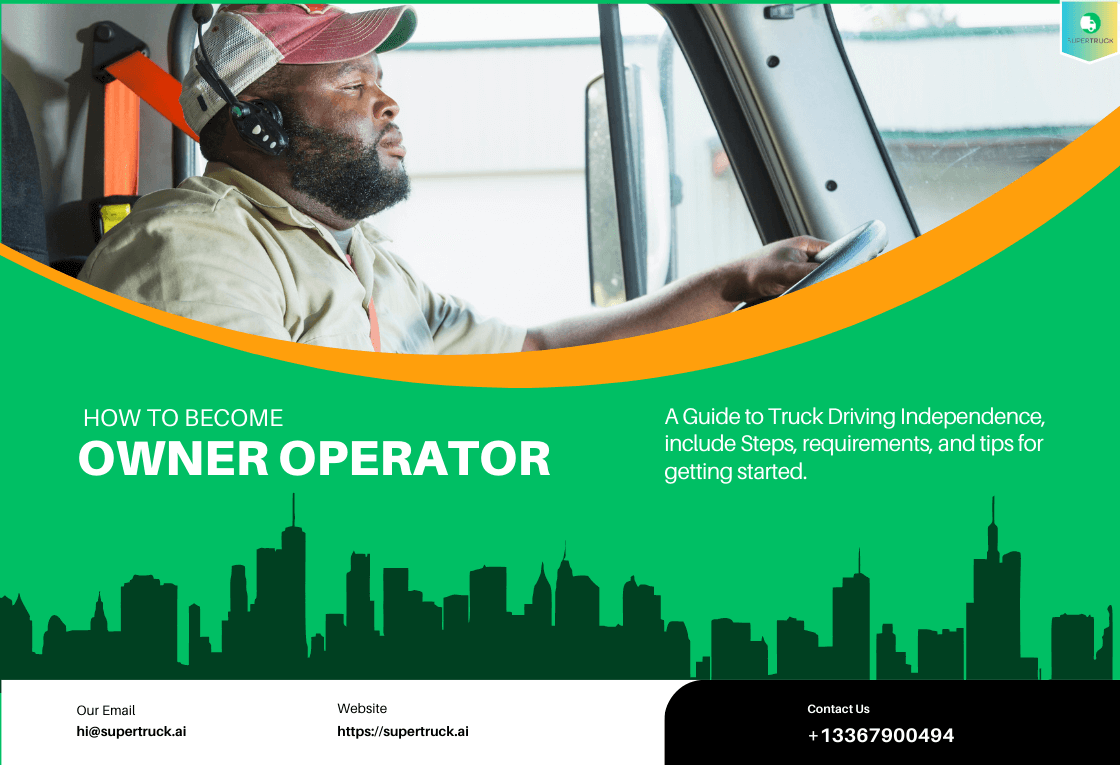
Technology

How to Become an Owner-Operator
Becoming an owner-operator in the trucking industry can be a profitable and satisfying career choice. As an owner-operator, you gain the freedom of running your own business while taking advantage of the skills and experience you've developed as a driver. However, transitioning from a company driver to an owner-operator involves careful planning and understanding of the industry. This guide will walk you through the essential steps to make your journey as smooth as possible.
As an owner operator, you'll be responsible for a wide range of tasks that require both business knowledge and practical skills. You'll need to purchase or lease your own truck, making careful considerations about the initial cost, fuel efficiency, and maintenance requirements. Once you've acquired your truck, you'll be responsible for managing its operating costs, which include fuel, insurance, tolls, and permits.
Additionally, you'll need to handle maintenance and repairs to ensure your truck is always in optimal condition. This involves scheduling regular check-ups, addressing any issues promptly, and keeping detailed maintenance records. To avoid legal complications and fines, you'll also need to navigate complex regulatory requirements, such as hours of service regulations, safety inspections, and environmental standards.
Becoming an owner-operator is a substantial financial commitment. Before taking the leap, evaluate your financial readiness carefully. Initial costs include purchasing or leasing a truck, insurance, and permits. Trucks can range from $30,000 to $150,000 or more. Additionally, factor in ongoing operating costs like fuel, maintenance, insurance, and other expenses.
When considering how to acquire a truck, you have the choice between buying or leasing. Buying a truck grants you full ownership from the start, allowing you to avoid lease payments and potentially save money over time. However, it requires a significant upfront investment. Leasing, on the other hand, can be more affordable initially but often comes with limitations on mileage, maintenance responsibilities, and other terms. This option can be suitable if you prefer a shorter-term commitment and want to avoid the long-term responsibilities of owning a truck.
To operate legally as an owner operator, you'll need to obtain a comprehensive set of licenses and permits. Ensure your Commercial Driver's License (CDL) is up-to-date and valid for the types of trucks you plan to drive. Additionally, you'll need to obtain a Motor Carrier Authority (MC Number) to operate as a for-hire carrier. To comply with federal regulations, you'll also require a USDOT Number issued by the FMCSA. If you plan to operate across state lines, you'll need to participate in the International Registration Plan (IRP) and International Fuel Tax Agreement (IFTA) to manage your registration and fuel tax obligations.
As an owner-operator, securing adequate trucking insurance is essential to protect your business and assets. You'll need various types of coverage, including liability insurance to cover damages or injuries caused by your truck, cargo insurance to protect the goods you're transporting, physical damage insurance to cover damage to your truck, and bobtail insurance to provide coverage when you're driving without a trailer.
As an owner operator, developing a comprehensive business plan is crucial for long-term success. Your plan should include a market analysis to assess the demand for trucking services in your region and identify the specific types of loads you want to haul. Additionally, you'll need to create financial projections that accurately estimate your income, expenses, and profitability. Finally, your plan should outline your operational plan, which includes strategies for finding loads, managing day-to-day operations, and maintaining your truck.
As an owner operator, building a strong network of clients and brokers is essential to securing consistent freight. To find loads, consider utilizing load boards, online platforms where carriers and shippers can connect and bid on freight. Additionally, working with freight brokers can provide access to a wider range of opportunities. For long-term stability, aim to establish direct relationships with shippers who have regular freight needs. By cultivating these connections, you can increase your chances of securing profitable loads and building a sustainable business.
As an owner-operator, you'll need to manage your own finances and ensure compliance with regulations. This includes bookkeeping, which requires keeping detailed records of your income and expenses. To simplify this process, consider using accounting software or hiring a professional accountant. Additionally, you'll need to file taxes as a business owner, which may involve quarterly estimated payments and deductions for business expenses.
As the trucking industry is constantly evolving, it's essential to stay informed and adapt. Keep up with changes in regulations, fuel prices, and market trends by following industry news, joining relevant associations, and attending networking events. This will help you stay ahead of the curve and connect with other professionals in the field.
No comments yet. Be the first to comment!
05 Aug 2024
14 Aug 2024
14 Aug 2024
14 Aug 2024
16 Aug 2024
20 Aug 2024
21 Aug 2024
22 Aug 2024
23 Aug 2024
25 Aug 2024
25 Aug 2024
26 Aug 2024
26 Aug 2024
27 Aug 2024
28 Aug 2024
29 Aug 2024
01 Sept 2024
01 Sept 2024
02 Sept 2024
03 Sept 2024
04 Sept 2024
05 Sept 2024
06 Sept 2024
08 Sept 2024
09 Sept 2024
10 Sept 2024
12 Sept 2024
13 Sept 2024
07 Oct 2024
17 Oct 2024
18 Oct 2024
22 Oct 2024
29 Oct 2024
05 Nov 2024
06 Nov 2024
08 Nov 2024
11 Nov 2024
19 Nov 2024
20 Nov 2024
©copyright 2024, supertruck.ai